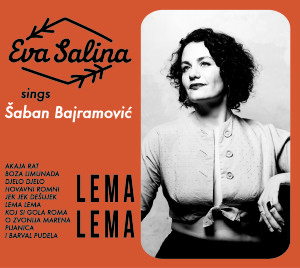 Lema Lema: Eva Salina Sings Šaban Bajramović is an amazing recording of Balkan Romani (Gypsy) music that’s filled with contradiction and paradox.
Lema Lema: Eva Salina Sings Šaban Bajramović is an amazing recording of Balkan Romani (Gypsy) music that’s filled with contradiction and paradox.
Šaban Bajramović was the king of Balkan Romani music in the 1960s and 1970s. Apparently a larger-than-life, somewhat outlaw figure, Bajramović recorded music that continues to resonate in the world of Serbian music today, both in its homeland and throughout the diaspora in Brooklyn, in Australia, and who knows where else. Eva Salina is an American who grew up in that hotbed of Balkan culture, Santa Cruz, California! As a young child she was fascinated with the music of other cultures, and happened upon a teacher of Balkan songs. She also was lucky enough to have parents who encouraged her, even allowing her to travel to the Balkans to study the music at the age of 12.
Salina has been teaching Balkan singing in Brooklyn for many years. Lema Lema is her first record. And what an assured and grounded record it is. She has taken the mostly acoustic songs of Bajramović and interpreted them in ways that reflect both their time and her own 21st century sensibilities. She is assisted by members of New York’s wildly diverse global and jazz music scenes, including artists from bands like Slavic Soul Party!, Kultur Shock, and The Klezmatics. The eclectic lineup of musicians includes Salina’s longtime musical partner, Romani accordionist Peter Stan, Jewish music icon Frank London, jazz-metal guitarist Brandon Seabrook, Indian percussionist Deep Singh, and multi-instrumentalists Ron Caswell and Patrick Farrell.
The songs, ah, the songs. They start with “Akaja Rat,” a fairly straightforward song in a simple four beats, rather than some of the more complex time signatures you’ll often find in Balkan dance music. But what a wildly creative arrangement and production! From the brief faux sample version of the song at the beginning that sounds like an old 78 RPM, it launches into a ’70s riot of Vox (or similar) organ, tubas and other brass, stabbing electronic effects, and tic-tac percussion. Salina’s supple soprano floats over it all, declaiming the lyrics with passion and control.
The final track is another kind of ’70s music. “I Barval Pudela” gets the classic rock treatment with arena-ready guitar riffage and full drum kit, turning it into heavy metal Balkan dance music. Far from ironic in her treatment of these songs, it seems to me that Salina rather is interpreting them in light of what the ’70s mean to her – cheesy organs, disco-type beats, jazz-rock trappings and metal guitars.
In between those bookends are eight songs with equally creative arrangements that range from near-traditional to more of the zaniness that erupts on “Akaja Rat.” “Boza Limunada” seems relatively straightforward—well, except for the 9/8 time signature, the rock drumming and the synth bass, and the distorted wah-wah guitar licks that erupt on the bridge. Actually, it’s not straightforward at all! Stick around for Peter Stan’s absolutely amazing punk-rock accordion solo toward the end, which seems to inspire everybody else to go all rock for the finale.
“Pijanica (the drunkard),” is also a fairly traditional song, but it has a spaghetti-western-style arrangement complete with Mariachi horn charts and that Vox organ, itself now fed through some kind of distortion pedal. “Koj Si Gola Roma,” has a medium dance tempo with more than a hint of reggae about its rhythm, and lots of deep brass, stabbing electric guitar and layers of percussion. Somebody has a fabulous trumpet solo on this one. The title track, “Lema Lema,” has a strong Euro-dancehall beat behind the wall of Balkan brass.
Salina’s vocal skills come to the front on three slower, sevdalinka-type songs: “Djelo Djelo,” with a beautiful accordion intro by Stan and some chiming electric guitar arpeggios behind her passionate vocal gymnastics. On “Jek Jek Desujek,” the organ and accordion play the complex melody in impressive unison during the intro, and later Salina’s vocals are doubled or tripled for a haunting, deep-in-the-foggy-forest effect.
“O Zvonija Marena” is another slow song with a concert-hall-worthy accordion intro that melds into sidewalk cafe style tune, a lovely melody that Salina sells almost casually. For all the pyrotechnics and wizardry of some of the other tracks, entertaining as they are, this might be my favorite.
Here is a live performance video of the song from the 2014 Brooklyn Folk Festival.
As you can see and hear, Eva Salina is the real thing. Lema Lema is a superb album.
Vogiton Records, 2016
Eva Salina has a website and is on Facebook.
NPR’s Weekend Edition interviewed Salina and played some of her music January 10, 2016:
